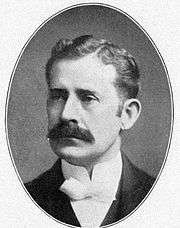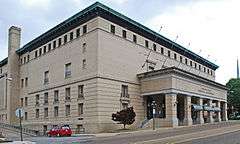R. H. Hunt
| Reuben Harrison Hunt | |
|---|---|
 | |
| Born |
February 2, 1862 Elbert County, Georgia |
| Died |
May 28, 1937 (aged 75) Chattanooga, Tennessee |
| Nationality | American |
| Occupation | Architect |
| Practice | R. H. Hunt Company |
| Buildings | Soldiers and Sailors Memorial Auditorium |
.jpg)
Reuben Harrison Hunt (February 2, 1862 – May 28, 1937), also known as R. H. Hunt, was an American architect who spent most of his life in Chattanooga, Tennessee.[1] He is considered to have been one of the city's most significant early architects.[2] He also designed major public building projects in other states.
He came to Chattanooga in 1882 and within four years had established a successful architectural firm. Hunt designed a number of Chattanooga's homes and public buildings, including the Soldiers and Sailors Memorial Auditorium (1922), the Joel W. Solomon Federal Building and U.S. Courthouse (1934) with Shreve, Lamb and Harmon,[3] the Hamilton County, Tennessee Courthouse (1912), the James (1907) and Maclellan (1924) buildings, the Carnegie Library (1905) and the St. John's Hotel (1915).
Hunt also designed churches throughout the South. This included well-known Chattanooga churches such as Second Presbyterian Church and First Baptist Church,[4] as well as The Tabernacle in Atlanta.[5] Numerous works by Hunt are preserved and listed on the National Register of Historic Places,[6] 21 of which are covered in one 1979 survey study.[7]
The U.S. Post Office and Courthouse in Chattanooga, Tennessee, built 1932-1933, was Hunt's last major work. Hunt designed every major public building constructed in Chattanooga between 1895 and 1935. He was also the architect of local churches, hospitals, and private office buildings, as well as similar public and private buildings throughout the South.[8] In 1938 the Chattanooga building was recognized by the American Institute of Architects as one of the 150 finest buildings constructed in the previous twenty years in the United States, and it was featured in an AIA photographic exhibit in America and Europe.[8]
Works
Projects credited to Hunt include:
- Alexandria Hall-Louisiana College, Louisiana College, Pineville, LA (Hunt,R. H., Co.) NRHP-listed[6]
- Austin Avenue Methodist Episcopal South Church, 1300 Austin Ave, Waco, TX (Hunt, R.H.) NRHP-listed[6]
- Brainerd Junior High, 4201 Cherryton Dr., Chattanooga, TN (Hunt,Reuben Harrison) NRHP-listed[6]
- Cadiz Downtown Historic District, Roughly Main St. from Scott to Franklin Sts., Cadiz, KY (Hunt,R.H.) NRHP-listed[6]
- Central United Methodist Church, 201 E. Third Ave., Knoxville, TN (Hunt, R.H. and Co.) NRHP-listed[6]
- Chattanooga Bank Building, 8th St., Chattanooga, TN (Hunt,Reuben Harrison) NRHP-listed[6]
- Chattanooga Car Barns, 301 Market St., Chattanooga, TN (Hunt,R.H.) NRHP-listed[6]
- Chattanooga Electric Railway, 211-241 Market St., Chattanooga, TN (Hunt,Reuben Harrison) NRHP-listed[6]
- Elbert County Courthouse, Courthouse Sq., Elberton, GA (Hunt,R.H.) NRHP-listed[6]
- First Baptist Church, 538 Linden Ave., Memphis, TN (Hunt, R.H.) NRHP-listed[6]
- First Baptist Church, 418 E. Bute St., Norfolk, VA (Hunt,Reuben H.) NRHP-listed[6]
- First Baptist Church Education Building, 317 Oak St., Chattanooga, TN (Hunt,Reuben Harrison) NRHP-listed[6]
- First Methodist Church of Greenwood, 310 W. Washington St., Greenwood, MS (Hunt,Reuben Harris) NRHP-listed[6]
- First Presbyterian Church, AR 79B, Fordyce, AR (Hunt,Reuben Harrison) NRHP-listed[6]
- First Presbyterian Church, 300 E. Main, El Dorado, AR (Hunt,R. H., & Associates) NRHP-listed[6]
- Fountain Square, 600–622 Georgia Ave. and 317 Oak St., Chattanooga, TN (Hunt,R.H.) NRHP-listed[6]
- Grove, E. W. Henry County High School, Grove Blvd., Paris, TN (Hunt,R. H.) NRHP-listed[6]
- Hamilton County Courthouse, W. 6th St. and Georgia Ave., Chattanooga, TN (Hunt,R.H.) NRHP-listed[6]
- Henderson Hall, Tennessee Technological University, Dixie Ave., Cookeville, TN (Hunt,Reuben H.,& Co.)
- Henry County Courthouse, Court Square, Paris, TN (1896)
- Highland Park Methodist Episcopal Church, Bailey Ave., Chattanooga, TN (Hunt,Reuben Harrison) NRHP-listed[6]
- James Building, 735 Broad St., Chattanooga, TN (Hunt,Rueben Harrison) NRHP-listed[6]
- Joel W. Solomon Federal Building and U.S. Courthouse (Hunt, R.H., Shreve, Lamb and Harmon) (1934)
- Kimsey Junior College, 244 TN 68, Ducktown, TN (Hunt,R.H.) NRHP-listed[6]
- Lander College Old Main Building, Stanley Ave. and Lander St., Greenwood, SC (Hunt,Reuben Harrison) NRHP-listed[6]
- Lawrence County Courthouse, N. side Broad St. between Jefferson and Washington Sts., Monticello, MS (Hunt,Reuben) NRHP-listed[6]
- Maclellan Building, 721 Broad St., Chattanooga, TN (Hunt,R.H.) NRHP-listed[6]
- McFarlin Memorial Auditorium, 6405 Hillcrest Rd., Dallas, TX (Hunt,R.H.) NRHP-listed[6]
- Medical Arts Building (Chattanooga, Tennessee), McCallie Ave., Chattanooga, TN (Hunt,Reuben Harrison) NRHP-listed[6]
- Miller Brothers Department Store, 629 Market St., Chattanooga, TN (Hunt,Reuben H.) NRHP-listed[6]
- Missionary Ridge Historic District, N. and S. Crest Rd. from Delong Reservation to 700 S. Crest Rd., Chattanooga, TN (Hunt, Reuben Harrison) NRHP-listed[6]
- Montgomery Hall, Mississippi State University campus, Starkville, MS (Hunt,R.H.) NRHP-listed[6]
- Municipal Building, E. 11th St., Chattanooga, TN (Hunt,Reuben Harrison) NRHP-listed[6]
- Nathan L. Bachman School, 281 Anderson Pike, Walden, TN (Hunt, R.H. & Co.) NRHP-listed[6]
- North Alexander School, North Alexander Avenue, Washington, GA 30673
- Northside United Presbyterian, 923 Mississippi Ave., Chattanooga, TN (Hunt,Reuben Harrison) NRHP-listed, the one known Greek Revival work by Hunt in Hamilton County[6][7]
- Old Library Building, 200 E. 8th St., Chattanooga, TN (Hunt,Reuben Harrison) NRHP-listed[6]
- Paris Commercial Historic District, Along sections of E. and W. Wood, W. Washington, N. and S. Poplar, N. and S. Market, Fentress and W. Blythe Sts., Paris, TN (Hunt,Rueben H.) NRHP-listed[6]
- Polk County Courthouse, Bounded by US 411 and Ward, Commerce and Main Sts., Benton, TN (Hunt, R.H. & Co. et al.) NRHP-listed[6]
- Polk Street Methodist Church, 1401 S. Polk St., Amarillo, TX (Hunt,R.H.,Co.) NRHP-listed[6]
- Second Presbyterian Church, 700 Pine St. Chattanooga TN (Hunt,Reuben Harrison) NRHP-listed[6]
- Soldiers and Sailors Memorial Auditorium, McCallie Ave., Chattanooga, TN (Hunt,Reuben Harrison) NRHP-listed[6] (1922)
- South Main Street Historic District, 200–422 S. Main St;. Pikeville, TN (Hunt, R. H.) NRHP-listed[6]
- Tivoli Theater, 709 Broad St., Chattanooga, TN (Hunt,Reuben Harrison) NRHP-listed[6]
- Trinity Methodist Episcopal Church, McCallie Ave. Chattanooga TN (Hunt,Reuben Harrison) NRHP-listed[6]
- Frances Willard House, 615 Lindsay St., Chattanooga, TN (Hunt,Reuben Harrison) NRHP-listed[6]
- Winona Commercial Historic District, Roughly bounded by Magnolia St., Central Ave., Carrollton St. and Sterling Ave., Winona, MS (Hunt, R. H.) NRHP-listed[6]
- Wisteria Hotel, Central Ave., Winona, MS (Hunt,R.H. & Co.) NRHP-listed[6]
- Wyatt Hall, 865 E. Third St., Chattanooga, TN (Hunt,Reuben H.) NRHP-listed[6]
References
- ↑ Butler, Sara A., "TN Encyclopedia: REUBEN HARRISON HUNT", Tennessee Encyclopedia of History and Culture, retrieved 2009-01-29
- ↑ National Register of Historic Places Nomination Form: Buildings in Hamilton County Designed by R. H. Hunt, 1980
- ↑ Townsend, Gavin (2010). "Chattanooga, Tennessee: A City Transformed" (PDF). Newsletter of the Southeast Chapter of the Society of Architectural Historians. Society of Architectural Historians. 27 (2).
- ↑ Wilson, John (March 7, 2004), "Architect R.H. Hunt's "References"", The Chattanoogan, retrieved April 9, 2010
- ↑ "Plans Accepted for Tabernacle; Work Will Begin", The Atlanta Georgian and News, VI (82), p. 7, November 8, 1907, retrieved April 8, 2010
- 1 2 3 4 5 6 7 8 9 10 11 12 13 14 15 16 17 18 19 20 21 22 23 24 25 26 27 28 29 30 31 32 33 34 35 36 37 38 39 40 41 42 43 44 45 46 National Park Service (2009-03-13). "National Register Information System". National Register of Historic Places. National Park Service.
- 1 2 M. A. Carver (February 1979). "National Register of Historic Places Thematic Group: Buildings in Hamilton County Designed by R. H. Hunt" (PDF).
- 1 2 "GSA - Find a Building". Joel W. Solomon Federal Building and U.S. Courthouse, Chattanooga, TN: Building Overview. U.S. General Services Administration. 2009-08-24.
